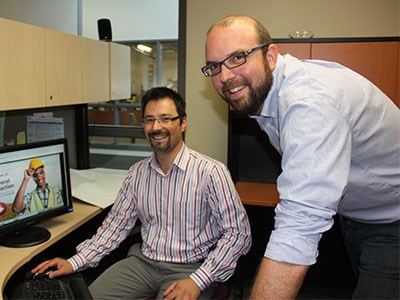The Northern Centre for Advanced Technology (NORCAT) is sharing its expertise in health and safety training with Base Titanium Limited for a new open pit titanium mine under construction in Kenya.
The mine’s Kenyan workforce will be trained to Canadian standards for health and safety.
NORCAT CEO Don Duval said the partnership was formed after they met at the Prospectors and Developers Association of Canada conference earlier this year.
“We really wanted to demonstrate to the international markets what we do so well. There was some very strong interest from Mexico and South America, as well as from some properties in Africa. Base Titanium, recognizing our history and capabilities, saw a good fit.”
Duval describes the new partnership as “unbelievably exciting,” not only for NORCAT, but also for Sudbury and Canada. “We are eminent in the field of mining and now is the time to export this expertise,” he said.
Duval realizes that health and safety training is not a one size fits all operation. “Every site, every country, every region of the world, especially outside of Canada, has different nuances that we’re really learning to understand,” he said. “Health and safety is about ensuring productivity while protecting the worker.”
Culturally appropriate
The training is being developed by a host of professionals and experts in the fields of mining health and safety, along with script writers and graphic designers, to deliver a unique e-learning platform. The training is also designed to reflect the cultural uniqueness of the region the mine is operating in, as well as deliver a level of technology appropriate to the area.
Training materials are being delivered in English and translated into Swahili.
“We see more and more these days that there’s a cultural component to the health and safety training,” said Jason Bubba, director of training and development at NORCAT. “Whether we are in northern parts of Canada or in Africa, mining companies are becoming more aware of cultural sensitivities, and that’s not only for the workers, but also contractors who might not be from the area. Mining companies realize that somebody from outside that geographical area needs to be sensitive to those who live in and around the area.”
The fully narrated orientation package is downloaded onsite and takes about one hour. Some locations are more capable of handling the technology, whereas remote sites need some tweaking for the programs to run smoothly, and this is all taken into consideration when designing the training.
“The program includes video segments, still photography, music and all sorts of information to make it lively and to keep the person engaged in the program,” said Bubba.
Curriculum writers have had to create material that can be used with workers who might have a grade eight reading level, as well as for scientists and engineers.
The training is completed in an exam-like environment where workers are given review questions throughout the process.
Participants are tested at the end and the records are stored in a central database in Sudbury. The test can be done repeatedly to ensure workers understand the information needed to work safely.
Workers as well as contractors can easily access the training through the Internet to ensure everyone involved has a minimum level of safety training. With the information being stored in a central database, the records can be securely accessed as workers come on and off a job site - not much different than what NORCAT provides Vale and Xstrata.
Long-term partnership
A significant benefit of working with NORCAT is that the training is not a one-time product. It’s a long-term partnership that allows NORCAT to create a more nuanced health and safety curriculum.
“Health and safety is a core strategic imperative for all the mining companies globally. Therefore, they prefer partnerships that listen and adjust the training as needed,” said Duval.
Additional training modules will include fall protection and lock-out training.
Bubba describes NORCAT as a health and safety solutions partner.
“We like to build a partnership with the companies so that we grow with them.”
As the needs of the mining company changes, additional training that reflects the site-specific nature of their operations can be developed.




